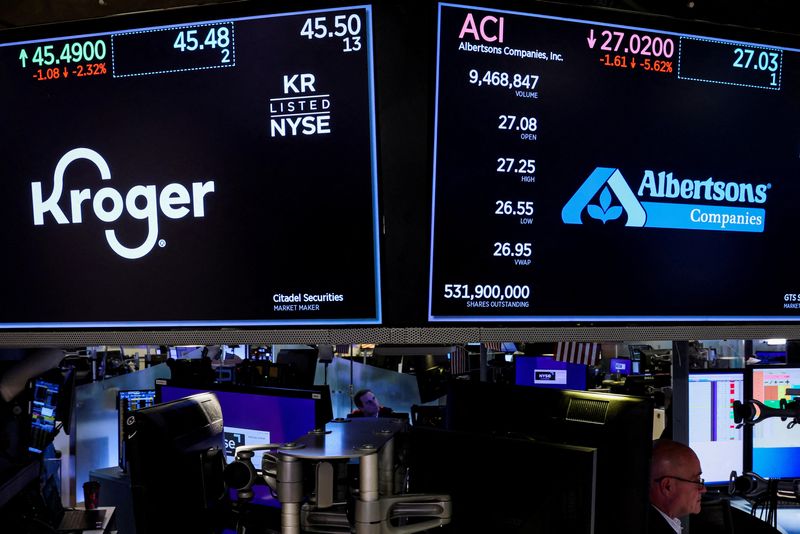By Anirban Sen and Abigail Summerville
(Reuters) - Supermarket operators Kroger (NYSE:KR) Co and Albertsons Companies Inc are advancing plans to sell between 250 and 300 stores they hope will alleviate U.S. antitrust concerns over their combination, according to people familiar with the matter.
The divestitures would come as the Federal Trade Commission (FTC), which is reviewing Kroger's proposed $24.6 billion acquisition of Albertsons, is under pressure from some U.S. lawmakers and consumer advocacy groups to block it over concerns it could lead to grocery price hikes when inflation has already been raging.
The stores that Kroger and Albertsons may sell could be worth more than $1 billion, the sources said. They are located across all the regions where the two companies operate - for example, the Pacific Northwest, Southern California, Phoenix and Chicago.
Between them, Kroger and Albertsons operate a total of 4,996 stores. The companies have started to sound out potential buyers for the stores and have been discussing their plans with the FTC to get its blessing, the sources added.
The companies had previously said they may divest between 100 and 375 stores by placing them in a new company that Albertsons shareholders would own, although in a regulatory filing Kroger said the upper limit for divestitures was 650 stores. Kroger and Albertsons will choose to proceed with the spin-off if they are unable to strike a deal with a potential buyer.
Prospective buyers for the stores include rival grocery store operators that are looking to expand their U.S. footprint, such as Ahold Delhaize, the sources said. Netherlands-based Ahold operates the Stop & Shop, Giant, Food Lion and Hannaford chains in the United States.
The sources requested anonymity to discuss confidential deliberations. Kroger, Albertsons and the FTC declined to comment.
Five antitrust experts Reuters interviewed said a key focus for the FTC will be the financial viability of the stores divested.
This is because FTC Chair Lina Khan has cited the failure of divestitures in a previous supermarket merger involving Albertsons and Safeway as a reason for the agency to be skeptical about the merits of such move.
When Albertsons agreed to the $9 billion acquisition of Safeway in 2014, it got regulatory clearance by signing a deal to sell 146 stores to West Coast regional grocer Haggen for $300 million. Haggen filed for bankruptcy months later and blamed the deal with Albertsons for its demise. Albertsons then agreed to buy many of the Haggen stores back for $300 million.
In a Harvard Law & Policy Review article published five years ago, Khan wrote that "even a casual observer could have predicted that Haggen would have great difficulty expanding its store fronts nearly ten-fold" following its deal with Albertsons, and argued that the antitrust remedy "backfired."

Brian Concklin, a partner at law firm Clifford Chance who advises on antitrust matters and is not involved in the Kroger-Albertsons deal, said that to stand a chance, Albertsons and Kroger would need to make sure they are shedding stores that can be formidable enough competitors in the eyes of the FTC.
"(The Albertsons-Safeway deal) will loom large over how these assets are viewed and how the FTC evaluates whether these divestiture packages being offered are viable," Concklin said.